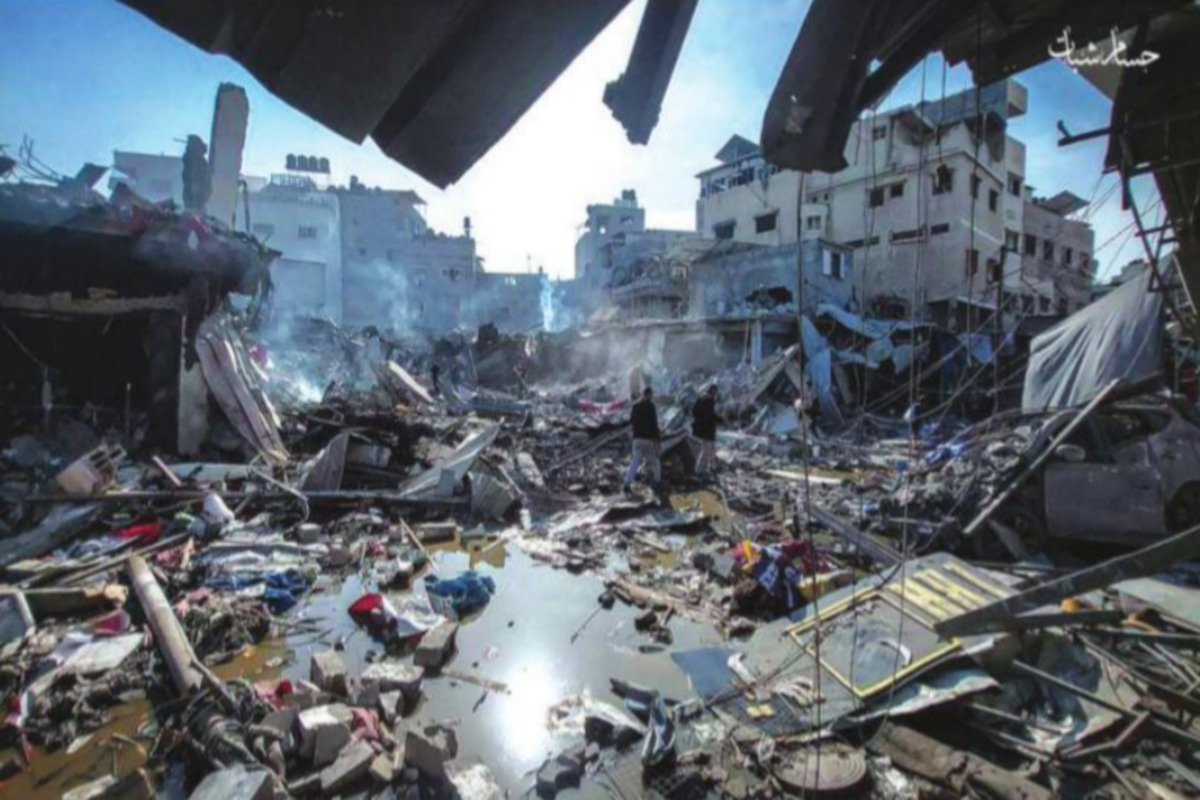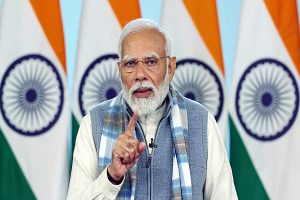It is a horrific irony that Israel has been accused of committing the world’s most heinous crime ~ geno- cide, a crime that is so deeply intertwined with its history and identity.
Israel was founded in 1948 as a Jewish state in the aftermath of the systematic state-spon- sored genocidal killing of six million Jews in the Holocaust by Nazi Germany.
The concept of genocide was coined in 1944 by a Polish lawyer of Jewish descent, Rap- hael Lemkin to describe the hor- ror of the Nazis’ systematic ex- termination of Jews by combin- ing two words, “genos,” which means race, nation, or tribe in ancient Greek, and “cide,” meaning to kill in Latin.
He initiated a global move- ment to outlaw genocide, which finally culminated in the adop- tion of a Convention on the Prevention and Punishment of the Crime of Genocide on 9 December 1948, by the United Nations (UN) General Assembly, which recognised it as an inter- national crime.
The Genocide Convention defines genocide as “any of the… acts committed with intent to destroy, in whole or in part, a national, ethnical, racial, or reli- gious group, as such.”
The acts include “killing members of the group, causing serious bodily or mental harm to members of the group, delib- erately inflicting on the group conditions of life calculated to bring about its physical destruc- tion in whole or in part, impos- ing measures intended to pre- vent births within the group, and/or forcibly transferring children of the group to another group.”
The crime of genocide has two elements: intention and execution, both of which have to be proven when accusations are made. One has to prove that the perpetrator not only committed the actions, but they committed the forbidden acts with a very specific intention of destroying the group, in whole or in part.
The accusations of carrying out or inciting genocide against Palestinians by Israel during the on-going Israeli-Palestinian con- flict that began on 7 October 2023, have come from different quarters ~ scholars, human righ- ts organisations, and states. Raz Segal, an Israeli historian and director of the Holocaust and Genocide Studies programme at Stockton University, described the Israeli counter-offensive against Hamas in Gaza as a “textbook case of genocide.”
Similar sentiments have been echoed by Craig Mokhiber, former director of the New York office of the UN High Commissioner for Human Rights, who resigned from his job in October last year in protest over the organisa- tion’s inability to stop the “geno- cide” of Palestinian civilians in Gaza.
He described Is- rael’s Gaza onslau- ght as the “most clear-cut case of genocide” that he had seen in his career. Amid inter- national criticism of Israel for its continued bombing of Gaza, South Africa moved the Interna- tional Court of Justice (ICJ) on December 29 last year, accusing Israel of committing genocide against Palestinians in its mili- tary campaign in Gaza and fail- ing to hold senior Israeli officials and others accountable for their direct and public incitement to genocide. And more recently, on January 31, a United States (U.S.) federal court in California ruled that Israel’s military cam- paign in Gaza “plausibly” am- ounts to genocide.
The lawsuit was filed seek- ing an order directing the Presi- dent and other U.S. officials to exert their influence over Israel to stop its bombing, to lift the siege in Gaza, and to stop pro- viding or facilitating the sales of weapons and arms to Israel.
Though the court dismissed the case due to lack of jurisdic- tion, Judge Jeffrey White still implored the White House “to examine the results of their unflagging support of the mili- tary siege against the Palestini- ans in Gaza.”
In its 84-page application to the ICJ, South Africa accused Israel of committing genocidal acts, include killing Palestinians, causing serious mental and bod- ily harm, and deliberately inflict- ing conditions meant to “bring about their physical destruction as a group,” as evident in the mass levels of deaths and des- truction and the total siege of basic necessities ~ like water, food, fuel, and medical supplies.
Since these acts alone cann- ot constitute geno- cide unless com- mitted with a spe- cific intent to des- troy Palestinians, in whole or in part, South Africa cited the incendiary sta- tements and de- humanising rhe- toric of Israeli offi- cials calling for the “total destruction”, and “erasure” of Gaza, the need to “finish them all.”
In a provision- al order delivered on January 26, the ICJ ruled that at least some of Israel’s actions in Gaza amount to genocide.
Though the ICJ failed to order an immediate cease-fire as sought by South Africa, it cate- gorically ruled that Israel must take all possible measures to prevent genocide against Pales- tinians in Gaza.
Though it will take years for the ICJ to render a decision on the merits, it ordered six provi- sional measures, including to limit the death and destruction caused by its military campaign, to prevent and punish direct and public incitement to genocide, and to take immediate and ef- fective steps to ensure that hu- manitarian assistance is provid- ed to civilians in the besieged Gaza Strip.
Most crucially, the court also ordered Israel to preserve evidence of genocide and to submit a report to the ICJ with- in a month, of all measures undertaken in compliance with its order. In theory, the ICJ’s genocide rulings are legally binding, but the court has no mechanism to enforce its judg- ments. In situations of non- compliance, the only recourse left is to approach the Security Council, the UN’s highest deci- sion-making body, with a request to take special measures to enforce the ICJ’s judgment.
Israel, however, has man- aged to avoid international obligations because of the unconditional backing of the U.S. and its European allies, who have vetoed almost all UN Secu- rity Council resolutions critical of Israel, providing it the im- punity to commit grave and egregious violations of interna- tional law without fear of any repercussions.
It would be naive to expect Israel to abide by the ICJ ruling this time; instead, it has contin- ued its military offensive in Gaza unabashedly in the same man- ner and on the same scale as it had been doing before the court ruling. A Geneva-based independent organization, Euro-Med Human Rights Moni- tor, reported on February 11 that the Israeli army has maintained its rate of killing civilians, depriving them of their most basic human rights, besieging them, and starving them in defi- ance of the ruling of the world’s highest court.
The ICJ’s ruling against Israel may not have any practi- cal consequences, but it has cer- tainly immense symbolic value in the decades-long struggle of those who wanted to hold Israel accountable for its violations of international legal norms appli- cable during armed conflicts, as the conditions in Gaza are wors- ening day by day.
The decision may undoubt- edly contribute to building in- ternational public opinion aga- inst Israel, as the ICJ has record- ed in its ruling that the military operation conducted by Israel after 7 October 2023, has result- ed, inter alia, in tens of thou- sands of deaths and injuries and the massive destruction of homes, schools, medical facili- ties, and other vital infrastruc- ture, as well as the forcible dis- placement of the vast majority of the population.
The ICJ’s ruling is also a signal for Israel that the interna- tional community may not remain silent over its continued defiance of international law and its criminal conduct in Gaza.
The writer is a professor and teaches international law at Aligarh Muslim University and heads its Strategic and Security Studies Programme.












